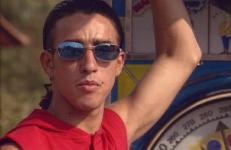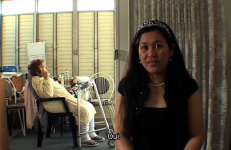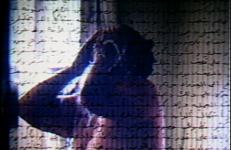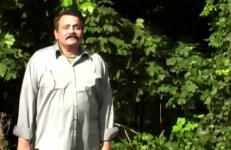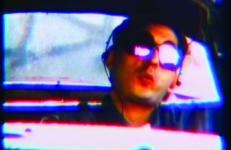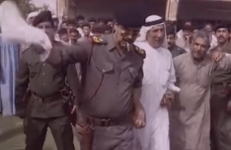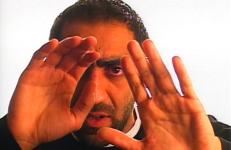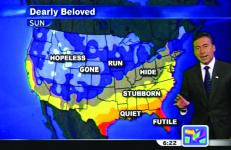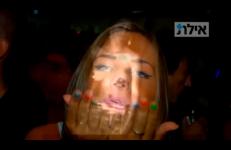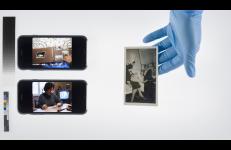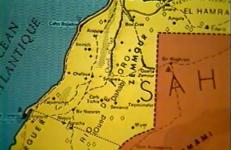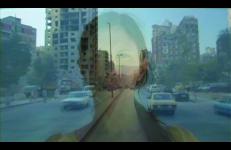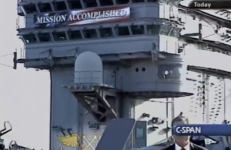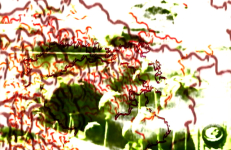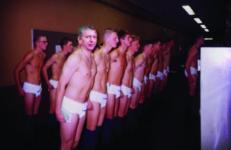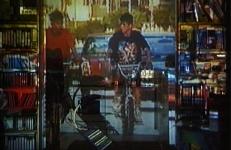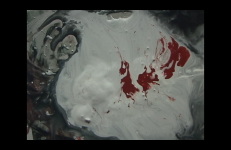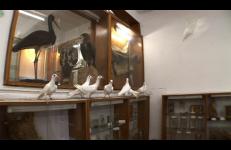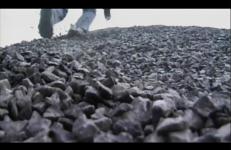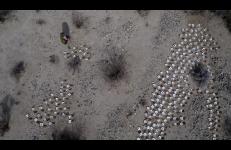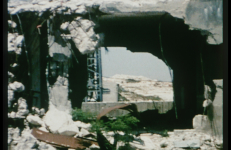Set in the industrial suburbs of Beirut, Majnounak (Crazy of You) explores male sexuality through interviews with three men who are asked to recount very openly the beginning, middle, and end of a sexual relationship they have experienced. The video explores the image they wanted to project of themselves, hence the image of the "male" they identify with. Their stories are alike, starting with seduction and ending after sex.
Middle East
There are approximately 30,000 Filipino guest workers living within the State of Israel. The majority are female and work as caregivers for the elderly or sick. In Tel Aviv they live in shanty town conditions around the central bus station also known as the ‘Tachana Mercazit’. On Saturdays, buses in the Tachana do not work, and this giant modernist building is occupied by guest workers, who spend their time shopping, partying and socializing in bars, clubs and shops within the compound. Beauty contests are very popular among Filipinos both at home and abroad.
In this video, the artist tries to overcome the effects of distance, and reflects on geography represented in exile due to war, and on the psychological distance represented in each one’s approach to her womanhood. The video beautifully weaves personal images and audio recordings of a very intimate nature, binding the personal with the political.
Mohamed Yousry: A Life Stands Still (also known as Good Translator) is a short documentary about Mohamed Yousry, a naturalized American citizen who's life changed radically after September 11, 2001. Mohamed immigrated to the United States in 1980. For the next twenty years, he developed a full and happy life, as a husband, father, and academic. On September 13, 2001 Mohamed was approached by the FBI on his doorstep in Queens, NY. After appeal processes and an attempt to extradite him, Mohamed was sentenced to four years in a federal penitentiary in Fort Worth, TX.
Mohamed Yousry: A Life Stands Still (also known as Good Translator) is a short documentary about Mohamed Yousry, a naturalized American citizen who's life changed radically after September 11, 2001. Mohamed immigrated to the United States in 1980. For the next twenty years, he developed a full and happy life, as a husband, father, and academic. On September 13, 2001 Mohamed was approached by the FBI on his doorstep in Queens, NY. After appeal processes and an attempt to extradite him, Mohamed was sentenced to four years in a federal penitentiary in Fort Worth, TX.
In 1985, Hassan Zbib and Olga Nakkas separately started to develop film scenarios based on simple narratives, and would shoot them on Super 8, which was still possible to develop in Beirut at the time. Their work featured the city as a stage where lonely characters drifted: a taxi driver in his car, a man walking around, talking to a Rambo poster.
In 1985, Hassan Zbib and Olga Nakkas separately started to develop film scenarios based on simple narratives, and would shoot them on Super 8, which was still possible to develop in Beirut at the time. Their work featured the city as a stage where lonely characters drifted: a taxi driver in his car, a man walking around, talking to a Rambo poster.
Through dancing, The Motherfucker's Birthday shows the evil of the dictator and the horror people endure under powerful political leaders. The film presents dancing, a universal and uniquely human activity often representing joy, with eerie footage of Saddam and his sons’ torture tools while they dance. Bush also dances with a smirk across the screen while announcing a war that would destabilize a whole region.
...were repeatedly raised and lowered and people grew exhausted from never knowing if the moment was at hand or was still to come A project of The Speculative Archive "Peace. I don't want it. Justice. Why? Victory? Makes me sick! Love? What a pity. Freedom? Ugly! Friendship? My ass!" Rami Farah, a young Syrian performer, uses various modes of address such as a promise, a threat, a curse, a joke, a lament, and a premonition in order to speak to the current state of affairs in Syria and the Middle East.
...were repeatedly raised and lowered and people grew exhausted from never knowing if the moment was at hand or was still to come A project of The Speculative Archive "Peace. I don't want it. Justice. Why? Victory? Makes me sick! Love? What a pity. Freedom? Ugly! Friendship? My ass!" Rami Farah, a young Syrian performer, uses various modes of address such as a promise, a threat, a curse, a joke, a lament, and a premonition in order to speak to the current state of affairs in Syria and the Middle East.
“Now too late, he understood her. The heart that pumped out love, the mouth that spoke the Word, didn’t count.”
--Toni Morrison, “Beloved”
O, Persecuted turns the act of restoring Kassem Hawal’s 1974 Palestinian Militant film Our Small Houses into a performance possible only through film. One that involves speed, bodies, and the movement of the past into a future that collides ideology with escapism.
Taking the idea of loss and dispossession as a starting point, this second reflection on photography and its people looks at the individual’s position within the context of war and how photographs become the sole record of that displacement, at the risk of them being dispersed as well.
A historical analysis of the on-going war in the Western Sahara. Liza Bear interviews Abdullah Majdid, the Polisario Front's United Nations representative. The tape addresses Morocco's U.S.-backed military effort to subjugate the indigenous Sahrawi population and annex one of the world's largest phosphate deposits, as well as the Sahrawis' conditions for a referendum.
Following on from the 2006 Israeli aggression on Lebanon, the filmmaker tries to film the destruction of Beirut. We witness a city deserted by life, and ghostly characters who, featured in his earlier films, talk about living through such a war.
This title is only available on Radical Closure.
Only a few weeks after the United States invaded Iraq in 2003, former President George W. Bush gave a televised speech on the aircraft carrier USS Abraham Lincoln declaring that his country had prevailed. Primetime Mr. President analyzes the speech, dubbed as “Mission Accomplished,” through the lens of what Iraqis had endured and would endure as a result of the war and its aftermath, from horrible insurgency, civil and sectarian wars, political corruption, and the overarching sense of death and despair.
The PSA Project No. 1-15 is a series of fifteen videos that speak out against the U.S. occupation of Iraq and the act of war.
Based on a set of drawings that depict George W. Bush's administration as wounded soldiers in the war against terrorism, RE:THE_OPERATION explores the sexual and philosophical dynamics of war through the lives of the members as they physically engage each other and the "enemy." Letters, notes, and digital snapshots "produced" by the members on their tour of duty become the basis of video portraits that articulate the neuroses and obsessions compelling them toward an infinite war.
Red Chewing Gum is a video letter that tells a story of separation between two men, set within the context of the changing Hamra, a formerly booming commercial center. The video looks at image making in relationship to consumption and the possession of desired subjects. It examines issues of desire and power, and the attempt to capture fleeting time.
Rosa juxtaposes the life of the filmmaker in two extreme locations (Baghdad and Montana) through three elements of nature: dust, rust and wind. The filmmaker uses these elements as a poetic introduction to navigate memories of his past and to compare them to his Montana present.
Shot in a local Natural History Museum in northern Israel. 100 white doves fly around cabinets of stuffed birds and other animals. This is a symbol of a culture which is unwilling to let the past go, and lives so naturally with the dead. They stand in silence, but fully present, as we continue living.
Note: This title is intended by the artist to be viewed in High Definition. While DVD format is available to enable accessibility, VDB recommends presentation on Blu-ray or HD digital file.
Ireland, October 20th 2007
The filmmaker returns to the city where he made the first video in the series and looks back at the events of the past six years.
Six Years Later is the eighth episode in the Hotel Diaries series, a collection of video recordings made in the world’s hotel rooms, which relate personal experiences and reflections to contemporary conflicts in the Middle East.
Skim Milk & Soft Wax explores Jewish identity from the point of view of the American filmmaker, who was raised to believe that Israel is the "land of milk and honey". However, the realities of her personal experiences of Israel collide with that Edenic image. Instead, the state of Israel is complex, shape shifting, and often disappointing. Therefore: skim milk — a substance of reduced nutritional value, but which still lives in the name of "milk". And wax, the stuff of religious offerings, which is always ready to change its shape.
The Sky Is Falling... is part of an ongoing series of performances that make up The Data Humanization Project.
Still Life gazes unflinchingly at the violence of war, observing the West Bank and Gaza Strip collapsed under Israeli occupation. This portrait provides brutal witness to how government sanctioned destruction metes upon structures of home and State.
Directed by Cynthia Madansky
Music by Zeena Parkins




